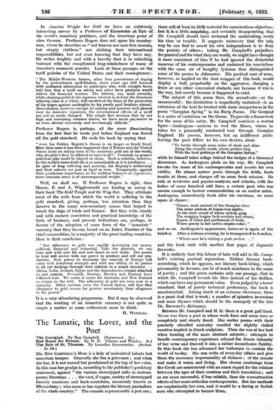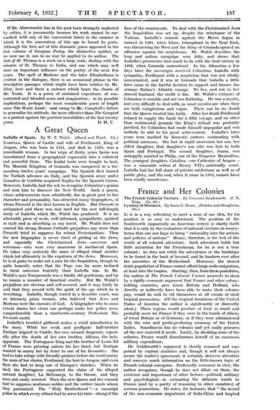The Lunatic, the Lover, and the Poet
The Georgiad. By Roy Campbell. (Boriswood. as.) Ma. Roy CA.W.PBELL'S Muse is a lady of undoubted talents but uncertain temper. Generally she has a grievance ; and When she has, it is not nursed but proclaimed at the top of her voice. In this ease her grudge is, according to the publisher's prefatory statement, against "lice various stereotyped culta in content. ,porary literature. . . the vast, if vague, society of stereotyped literary amateurs and back-scratchers, commonly known as Illoornsburr; Who more or less regulate the literary journalism of the whole country." The crusade is presumably a just one ; there will at least Le little material for conscientious objection; but it. is is little. surprishrg, and certainly disappointing, that Mr. Campbell should haVe reckoned the undertaking -worth his time or trouble. It suggests moreover that the only way he can lind to assert his own independence is _to deny the probity of others ; taking Mr. Campbell's prejudices for granted and for what they are worth, we might have thought it more consistent of him if he had ignored the distasteful ausurrus of his contemporaries and sustained his convictions 'with the -same air of. haughty lyricism that distinguished Some of the poems in Adamasfor. His poetical coat of arms, however, as implied on the dust wrapper of this book, would display a bull, perpetually on the aggressive, charging a fence or any other convenient obstacle, not because it was in the way, but merely because it happened to exist.
- The subject of this poem then, the second-rate—or the unsuccessful; the distinction is imperfectly sustained—is an extension of the text he treated with More compactness in the poem " Georgian Spring" in his Early Poems. The Georgiad is a series of variations on the theme. To provide a framework for the mass of his satire, Mr. Campbell contrives a central flgureAndrogyno—anxious to wed the Muses, whom he takes for a personally conducted tour through Georgian England. He proves, however, but an indifferent guide, leaving the poor fellow tri his own devices, alone
"To battle through some miles of slush and slime Along the country roads, whose getters -ring - . With the loud gushings of the Georgian Spring," vrhile he himself takes refuge behind the hedges of a thousand diversions. As Androgyno plods on his vay, Mr. Campbell tweaks the noses of his contemporaries and asserts his own virility. He chases nature poets through the fields hurls insults at them, and charges off on some fresh mission. He rails at reviewers and psycho-analysts, and attacks, with the lashes of some hundred odd lines, a certain poet who was unwise -enough to bestow commendation on an earlier satire. Androgyno, miraculously fresh after his exertions, vac meet again at dinner : " Dinner, most ancient of the Georgian rites, The noisy prelude al loquacious nights, At the mere sound of whose unholy gong The wagging tongue feels resolute and strong, Senate of bores and parliament of fools, Where gossip in her native empire rake ; "- -
and so on. Androgyno's appearance, however is again of the briefest. After a riotous evening, he is transported to London,
"Where noir he's editing a posh review. . "
and the book ends with another four pages Of dogmatic fireworks.
It is unlikely that this labour of hate will add to Mr. Camp- bell's existing poetical reputation. Neither literary back- scratching, which he opposes, nor literary back-biting, which presumably he favours, can be of much assistance to the cause of poetry ; and this poem contains only one passage, that in which Mr. Campbell reveals his likes instead of his dislikes, which can have any permanent value. Even judged by a lower standard, that of purely technical proficiency, the book is unsubstantial. Ambng much of an extreme cleverness, there is a great deal that is weak; a munber.of spineless inversions and some rhymes which should be the monopoly of the late Dr. Brewster's dictionary.
Between Mr. Campbell and H. D. there is a great gulf fixed. Never was there a poet in whose work form and sense were so -completely and clearly fused. Her earlier poems with their precisely chiselled austerity recalled the slightly chilled emotion implicit in Greek sculpture. Then she was at her best when treating of the more abstract subjects ; attempts to handle contemporary experience relaxed the frozen intensity of her verse and thawed it into a rather inconclusive fluidity. In this book she has advanced her technique to contain the world of to-day. She can write of everyday affairs and give them the necessary impersonality of distance ; of the remote and make it warm and living. Her chorus renderings from the Greek are constructed with an exact regard for the relation -between the ages of their creation and their translation ; and no are more successful, if less reliable, than the reconstructive efforts of her more orthodox contemporaries. But her methods are emphatically her own, and it would be a daring or foolish man who attempted to borrow them. If Mr. Abercrombie has in the past been strangely neglected by critics, it is presumably because his work cannot be ear- marked with any of the convenient labels in the manner in which it is the convention of this age to brand its poets. Although the first act of this dramatic poem appeared in the first volume of Georgian Poetry, the distinctive epithet, as we now use it, can in no way be applied to its author. The Sale of St. Thomas is a work on a large scale, dealing with the mission of St. Thomas to India, and one which may well have an important influence on the poetry of the next few years. The spell of Marlowe and the later Elizabethans is evident in the dialogues there is an occasional phrase in the descriptive passages which might have been written by Mr. Eliot, here and there a cadence which bears the charm of Mr. Yeats. It is a poem of sustained experience, of con- centrated and blended sense and imagination ; in its possible implications, perhaps the most considerable poem of length since Tire–Waste Land ; • -and owing to Mr. 'Campbell's failure to generalize his attitude, far More effectivethan The Georgiad as a protest against the poetical instabilities of the last twenty









































 Previous page
Previous page